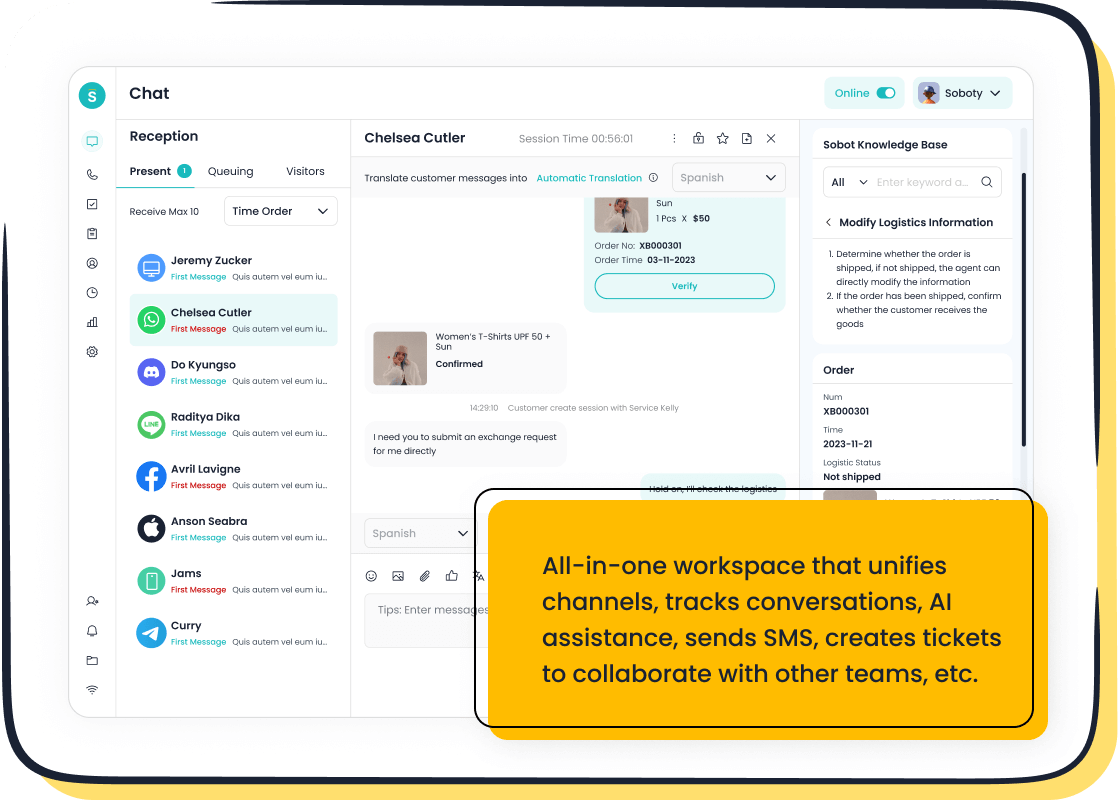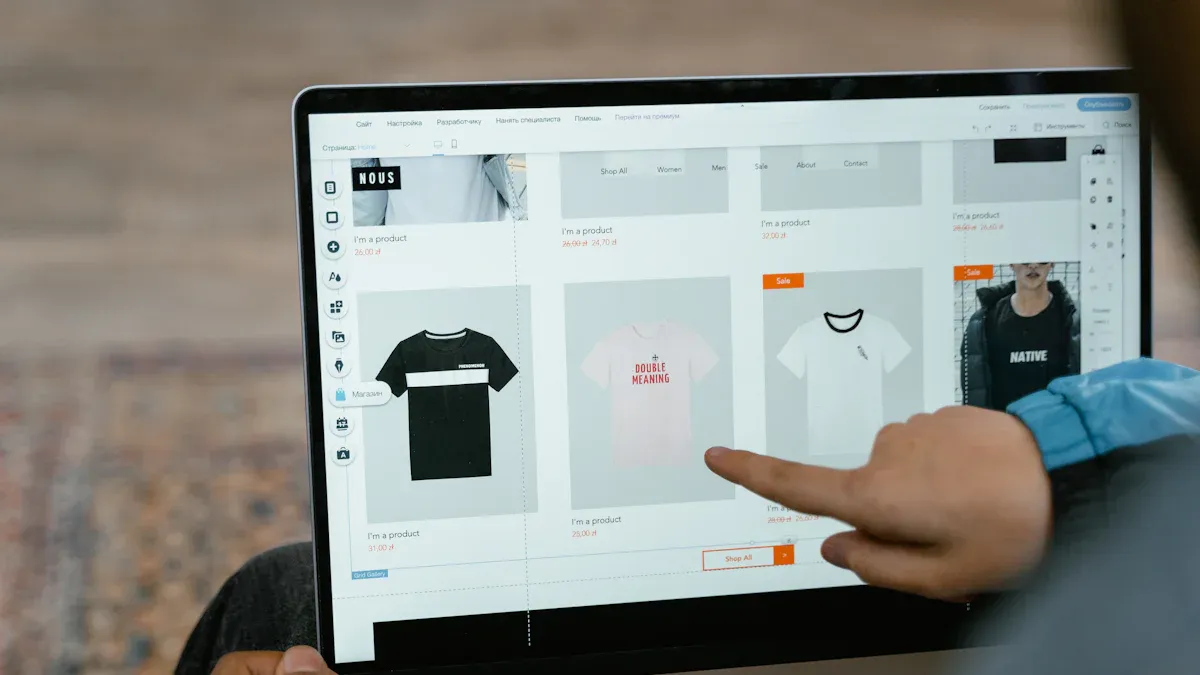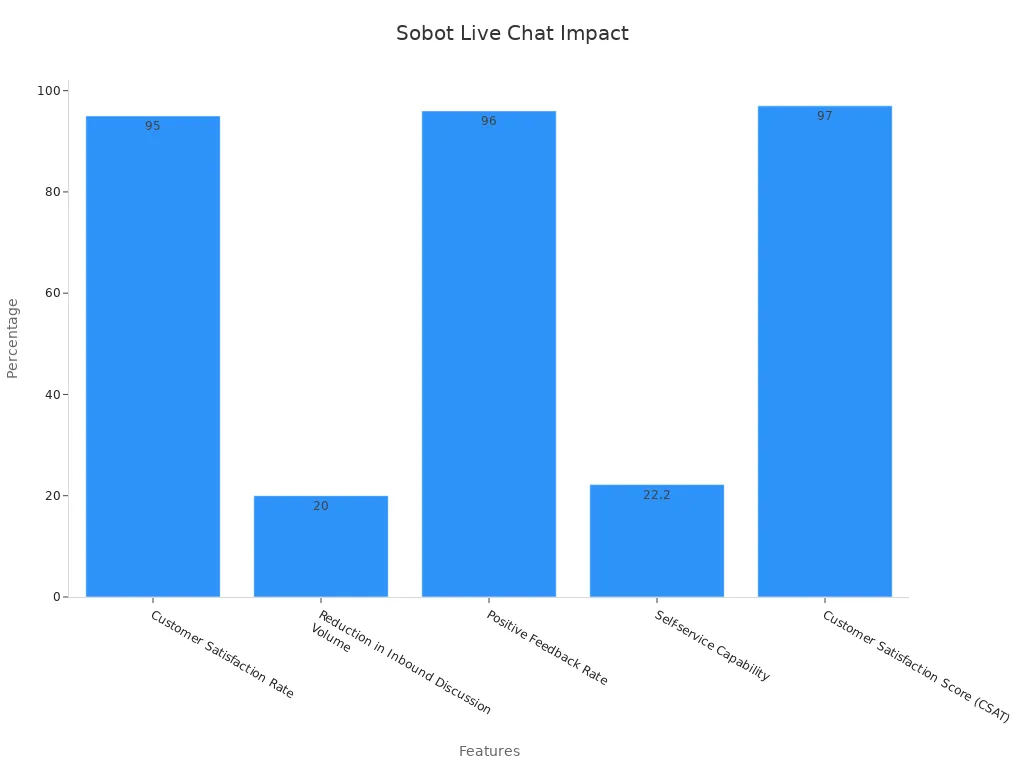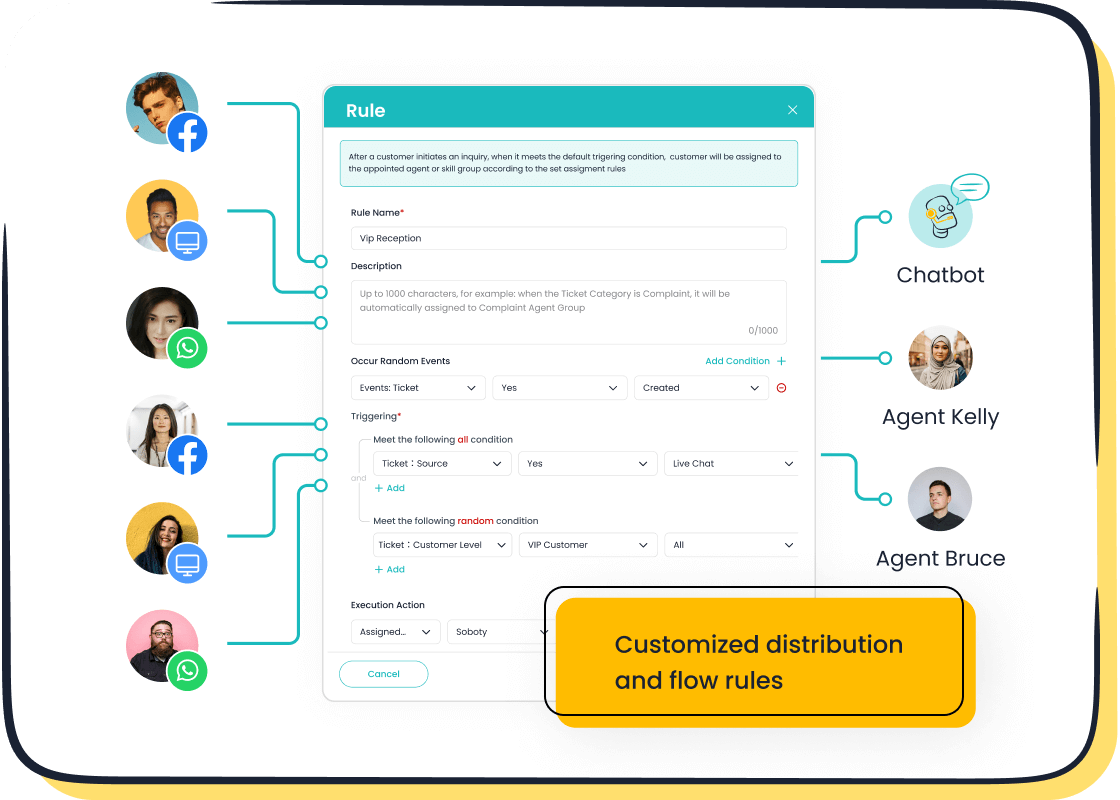5 eCommerce Conversion Pitfalls You Must Avoid in 2025

eCommerce conversion rates serve as a critical benchmark for business success. Industries like food and beverage boast rates as high as 4.9%, while sectors such as home and furniture struggle at just 1.4%. With desktop conversions outperforming mobile by 1.7 times, overlooking optimization opportunities can lead to fatal conversion rate optimization mistakes.
Proactive strategies like hyper-personalization and augmented reality are reshaping how businesses improve eCommerce conversion. Tools such as Sobot's AI-powered solutions enable seamless customer engagement, fostering trust and boosting conversions. In 2025, embracing these innovations will be essential for thriving in a competitive market.
Neglecting Mobile Optimization for eCommerce Conversion Rates

The Growing Importance of Mobile Shopping in 2025
Mobile shopping continues to dominate the eCommerce landscape. By 2025, mobile commerce sales are projected to reach $710 billion, accounting for 44% of total eCommerce sales. This growth highlights the need for businesses to prioritize mobile optimization to improve ecommerce conversion.
| Year | Mobile Commerce Sales (in billions) | Percentage of Total Ecommerce Sales |
|---|---|---|
| 2023 | $510 | 43% |
| 2025 | $710 | 44% |
Additionally, over 187 million active mobile shoppers are expected in the US by 2024. Globally, mobile commerce is forecasted to generate 59% of all eCommerce revenue, amounting to $4.01 trillion. These figures emphasize the financial incentives for businesses to deliver a user-friendly experience on mobile platforms. Neglecting mobile optimization risks alienating this growing customer base and missing out on significant revenue opportunities.
Common Mobile UX Mistakes That Hurt Conversions
Ignoring mobile optimization can lead to costly mistakes. Studies show that mobile users have lower tolerance for slow-loading websites, with delays of just a few seconds increasing abandonment rates.
Studies demonstrate a direct correlation between mobile-unfriendly websites and increased bounce rates, signifying the immediate negative impact on user engagement and potential conversion opportunities.
Other common errors include poor navigation, unresponsive buttons, and small text. These issues frustrate users and drive them to competitors. For example, 57% of customers would not recommend a business with a poorly designed mobile website, while 48% believe poor design reflects a lack of care.
| Mobile UX Mistake | Impact on Conversion Rates |
|---|---|
| Poor mobile optimization | Leads to high bounce rates and missed conversions, as users expect seamless functionality on mobile devices. |
| Slow loading times | Frustrates users, causing them to abandon the site, which negatively affects conversion rates. |
| Unintuitive navigation | Results in user frustration and increased likelihood of switching to competitors with better navigation. |
How Sobot Live Chat Enhances Mobile User Experience

Sobot Live Chat offers a powerful solution to address mobile UX challenges. Its omnichannel support ensures seamless communication across websites, apps, and social media platforms like WhatsApp and Instagram. By providing personalized experiences, Sobot helps businesses foster trust and satisfaction among mobile users.

Sobot Live Chat’s AI-powered tools also improve efficiency. Features like auto-translation and intelligent assignment streamline interactions, reducing inbound discussion volume by 20%. With a customer satisfaction score of 97%, Sobot demonstrates its ability to enhance mobile user experiences and drive ecommerce CRO. Businesses leveraging Sobot’s solutions can optimize their mobile platforms, ensuring faster website loading speed and a user-friendly experience that converts visitors into loyal customers.
Ignoring Data-Driven Insights in Conversion Rate Optimization
Why Analytics Are Key to Improving eCommerce Conversion
Analytics play a pivotal role in understanding your customers and refining your strategies. By analyzing metrics like bounce rates, conversion paths, and customer lifetime value (CLV), you can identify what works and what doesn’t. For instance, businesses that implement multi-touch attribution often see a 25% increase in conversion rates. This approach helps you understand how different channels contribute to your sales funnel, ensuring your marketing efforts are well-targeted.
| Metric | Description |
|---|---|
| Average Order Value (AOV) | Indicates the average amount spent per transaction, crucial for boosting revenue without increasing traffic. |
| Customer Lifetime Value (CLV) | Represents the total revenue expected from a customer over their relationship with the business. |
| Bounce Rate | The percentage of visitors who leave after viewing only one page; lower rates correlate with higher conversions. |
The average bounce rate for eCommerce sites is 45.68%, but top-performing sites maintain rates below 40%. If you aim to improve ecommerce conversion, focusing on these metrics can help you optimize your website and marketing strategies effectively.
Fatal Mistakes in Data Interpretation and Their Impact
Misinterpreting data can derail your eCommerce CRO efforts. Common mistakes include failing to isolate variables during A/B testing and making decisions based on assumptions rather than data. For example, if you don’t segment your data by traffic sources or devices, you might overlook critical insights about user behavior.
- Not isolating variables during A/B testing can lead to unclear conclusions about what influences user behavior.
- Making changes based on assumptions rather than data can result in ineffective optimizations that harm conversion rates.
Ignoring user behavior patterns, such as high bounce rates or abandoned carts, can also hinder your ability to improve ecommerce conversion. Conversion paths are often non-linear, and neglecting multichannel attribution can misguide your marketing efforts. Data evolves over time, so failing to adapt can lead to stagnation in ecommerce conversion rates.
Leveraging Sobot's Built-In Analytics for Smarter Decisions

Sobot’s built-in analytics provide a comprehensive solution for businesses looking to enhance their eCommerce CRO. With over 150 indicators, Sobot helps you track key metrics like bounce rates, AOV, and CLV. Its customizable data reports allow you to focus on the insights that matter most to your business.
For example, Sobot’s analytics can identify gaps in your conversion funnel, enabling you to make data-driven adjustments. By leveraging these insights, you can reduce bounce rates and optimize your marketing campaigns. Businesses using Sobot’s analytics have reported significant improvements in ecommerce conversion rates, thanks to smarter, more informed decisions.
Overcomplicating the Checkout Process

The Link Between Checkout Simplicity and eCommerce Conversion Rates
A simple checkout process can significantly improve ecommerce conversion rates. When customers encounter fewer steps and clear instructions, they are more likely to complete their purchases. Industry reports show that reducing checkout steps minimizes distractions and speeds up transactions. Offering a guest checkout option prevents cart abandonment by eliminating the need for account creation.
| Strategy | Impact on Conversion Rates |
|---|---|
| Reducing checkout steps | Minimizes distractions and speeds up the process, encouraging completion. |
| Guest checkout option | Prevents cart abandonment by allowing quick purchases without account creation. |
| Clarity in instructions | Ensures customers understand requirements, reducing frustration and speeding up transactions. |
By simplifying your checkout page, you create a seamless experience that encourages customers to finalize their purchases. This approach is essential for effective shopping cart optimization and conversion optimization.
Common Errors That Lead to Cart Abandonment
Complicated checkout processes often lead to high cart abandonment rates. The Baymard Institute estimates that nearly 69.57% of online shoppers abandon their carts, with long and confusing checkout flows being a major culprit.
- Unexpected costs, such as shipping fees, cause 48% of shoppers to leave their carts.
- Over 25% of customers abandon purchases due to mandatory account creation.
- Technical issues, including slow website speed, account for 17% of cart abandonments.
- The average checkout flow includes 5.2 steps and 11.8 form fields, which frustrates buyers.
These errors highlight the importance of streamlining your checkout process to reduce friction and improve ecommerce CRO. Addressing these issues can help you retain customers and boost conversion rates.
Streamlining Checkout with AI-Powered Tools

AI-powered tools like Sobot’s solutions can transform your checkout page into a conversion powerhouse. Sobot’s AI capabilities simplify the process by automating repetitive tasks and providing real-time support. For example, its intelligent assignment feature ensures customers receive timely assistance during checkout, reducing frustration.
Sobot’s AI copilots also enhance shopping cart optimization by offering personalized recommendations and resolving common issues instantly. These tools help you eliminate barriers that lead to cart abandonment, ensuring a smoother transaction experience. Businesses using Sobot’s solutions have reported higher conversion rates and improved customer satisfaction, demonstrating the value of AI in ecommerce CRO.
Failing to Build Trust and Credibility
Building trust and credibility is essential for improving eCommerce conversion. Without it, potential customers hesitate to make purchases, leading to lost revenue. Trust influences every stage of the buyer’s journey, from browsing to checkout. A lack of credibility can significantly reduce the likelihood of visitors taking desired actions on your site. On the other hand, fostering trust can boost conversion rates and drive revenue growth.
The Role of Social Proof in Conversion Rate Optimization
Social proof plays a critical role in influencing consumer behavior. It reassures potential buyers by showing that others have had positive experiences with your brand. For example, 93% of consumers say online reviews impact their purchase decisions, while 94% avoid businesses with poor reviews. Highlighting customer testimonials, ratings, and reviews on your website can make a significant difference.
In one case, emphasizing social proof during the registration process increased form submissions by 8.63%, resulting in an annualized revenue gain of $543,400. This demonstrates how effectively leveraging social proof can enhance your eCommerce CRO efforts.
Mistakes That Undermine Customer Confidence
Several common mistakes can erode customer confidence and harm your conversion optimization efforts:
- Surprise shipping costs often lead to abandoned carts.
- Long hold times frustrate customers and reduce loyalty.
- Poorly designed navigation confuses users and drives them away.
- Difficulty contacting customer service increases uncertainty.
For example, if your website lacks clear calls-to-action or has a complicated checkout process, customers may leave without completing their purchases. Addressing these issues is crucial to retaining trust and improving eCommerce conversion.
Using Sobot Live Chat to Foster Trust Through Real-Time Support

Sobot Live Chat offers a powerful way to build trust with your customers. Its real-time support capabilities ensure that users can get immediate assistance, reducing uncertainty during their shopping experience. Features like omnichannel support and intelligent assignment allow you to provide seamless, personalized service across platforms.
For instance, if a customer has questions about shipping costs or product details, Sobot Live Chat enables your team to respond instantly. This proactive approach fosters confidence and encourages customers to complete their purchases. Businesses using Sobot Live Chat have reported a 38% increase in conversions, showcasing its effectiveness in driving eCommerce CRO.
Overlooking Personalization Opportunities
Why Personalization is Essential to Improve eCommerce Conversion
Personalization has become a cornerstone of eCommerce success. Tailoring the shopping experience to individual preferences not only enhances customer satisfaction but also drives conversions. Studies reveal that:
- Over 55% of consumers are more likely to make repeat purchases after a personalized experience.
- 73% of customers prefer shopping experiences that feel tailored to their needs.
- 86% admit that personalization significantly influences their buying decisions.
These numbers highlight the growing demand for personalized interactions. When you deliver relevant product recommendations or customized offers, you create a sense of connection that encourages loyalty. Businesses that prioritize personalization often see higher customer retention and increased revenue. In fact, 63% of marketers report improved conversion rates due to personalization efforts.
| Statistic | Description |
|---|---|
| 63% | Marketers who experienced increased conversion rates through personalization |
Common Errors in Implementing Personalization
While personalization offers immense potential, many businesses make critical mistakes that hinder its effectiveness. Common errors include:
- Invading customers' privacy by collecting excessive personal data.
- Over-personalizing the experience, which can overwhelm shoppers.
- Relying solely on demographics instead of considering real-time behavior.
- Limiting recommendations to product pages rather than exploring broader contexts.
- Ignoring empty search results, which frustrates users instead of offering alternatives.
- Failing to retarget customers who previously showed interest.
For example, neglecting first-party data or overlooking the customer journey can lead to irrelevant recommendations. These missteps not only reduce conversion rates but also damage trust. To improve eCommerce conversion, you must strike a balance between personalization and user comfort.
How Sobot's AI Solutions Drive Tailored Customer Experiences
Sobot’s AI solutions empower businesses to deliver hyper-personalized experiences that resonate with customers. By leveraging advanced AI capabilities, Sobot helps you analyze customer behavior, preferences, and purchase history in real time. This enables you to offer tailored recommendations and promotions that align with individual needs.
For instance, Sobot’s AI copilots assist agents in crafting personalized responses, while its insights feature identifies gaps in your personalization strategy. Case studies like Delta Airlines’ “Ask Delta” initiative demonstrate how AI can enhance engagement and streamline operations. Additionally, hyper-personalized experiences have been shown to boost revenue by up to 40%, as seen in Sephora’s success.
| Evidence Type | Description |
|---|---|
| Case Study | Delta Airlines’ “Ask Delta” initiative demonstrates AI enhancing engagement and streamlining operations. |
| Statistic | Hyper-personalized experiences can increase revenue by up to 40%, as evidenced by Sephora’s success. |
| Future Projection | By 2025, over 95% of customer interactions are expected to involve AI, indicating a significant shift in customer engagement. |
By integrating Sobot’s AI solutions, you can create meaningful connections with your customers, improve eCommerce conversion rates, and stay ahead in the competitive market.
Avoiding the five pitfalls can transform your eCommerce strategy in 2025. Neglecting mobile optimization, ignoring analytics, overcomplicating checkout, failing to build trust, and overlooking personalization have led to the downfall of brands like Toys "R" Us and Kmart. These mistakes reduce customer satisfaction, loyalty, and revenue.
Sobot Live Chat offers tools to address these challenges. Its omnichannel support, AI-powered analytics, and real-time assistance simplify processes and enhance customer engagement. By leveraging Sobot’s solutions, you can optimize your website, foster trust, and deliver personalized experiences.
Take proactive steps today. Prioritize mobile-friendly designs, analyze data effectively, and streamline checkout. Build credibility and tailor interactions to meet customer needs. These strategies will help you boost eCommerce conversion rates and thrive in a competitive market.
FAQ
What is eCommerce conversion, and why does it matter?
eCommerce conversion refers to the percentage of website visitors who complete a desired action, like making a purchase. It matters because higher conversion rates directly impact revenue. For example, improving your conversion rate from 2% to 3% could increase sales by 50% without additional traffic.
How can Sobot Live Chat improve eCommerce conversion rates?
Sobot Live Chat enhances customer engagement by offering real-time support across multiple channels. Its AI-powered tools provide personalized assistance, reducing bounce rates and increasing conversions by 38%. Features like auto-translation and intelligent assignment ensure seamless communication, fostering trust and satisfaction.
Why is mobile optimization crucial for eCommerce in 2025?
Mobile commerce will account for 44% of total eCommerce sales by 2025, generating $710 billion. Optimizing for mobile ensures a user-friendly experience, reducing bounce rates and increasing conversions. Neglecting mobile optimization risks losing a significant portion of this growing market.
How does personalization impact eCommerce conversion?
Personalization tailors the shopping experience to individual preferences, boosting satisfaction and loyalty. Studies show 63% of marketers report increased conversion rates due to personalization. Sobot’s AI solutions analyze customer behavior to deliver tailored recommendations, driving higher engagement and revenue.
What role does trust play in improving eCommerce conversion?
Trust influences every stage of the buyer’s journey. Customers hesitate to purchase from websites with poor reviews or unclear policies. Sobot Live Chat builds trust by providing real-time support, ensuring customers feel confident and informed during their shopping experience.
See Also
Best Ecommerce Live Chat Solutions to Use in 2024
A Guide to Implementing Omnichannel Contact Center Strategies
Ways Live Chat Software Increases Ecommerce Sales Effectively
